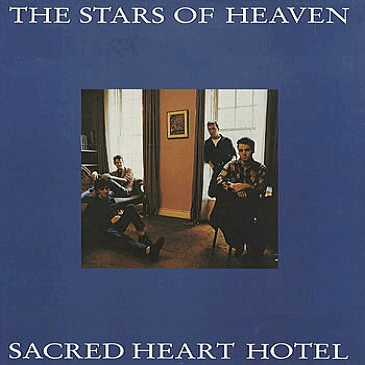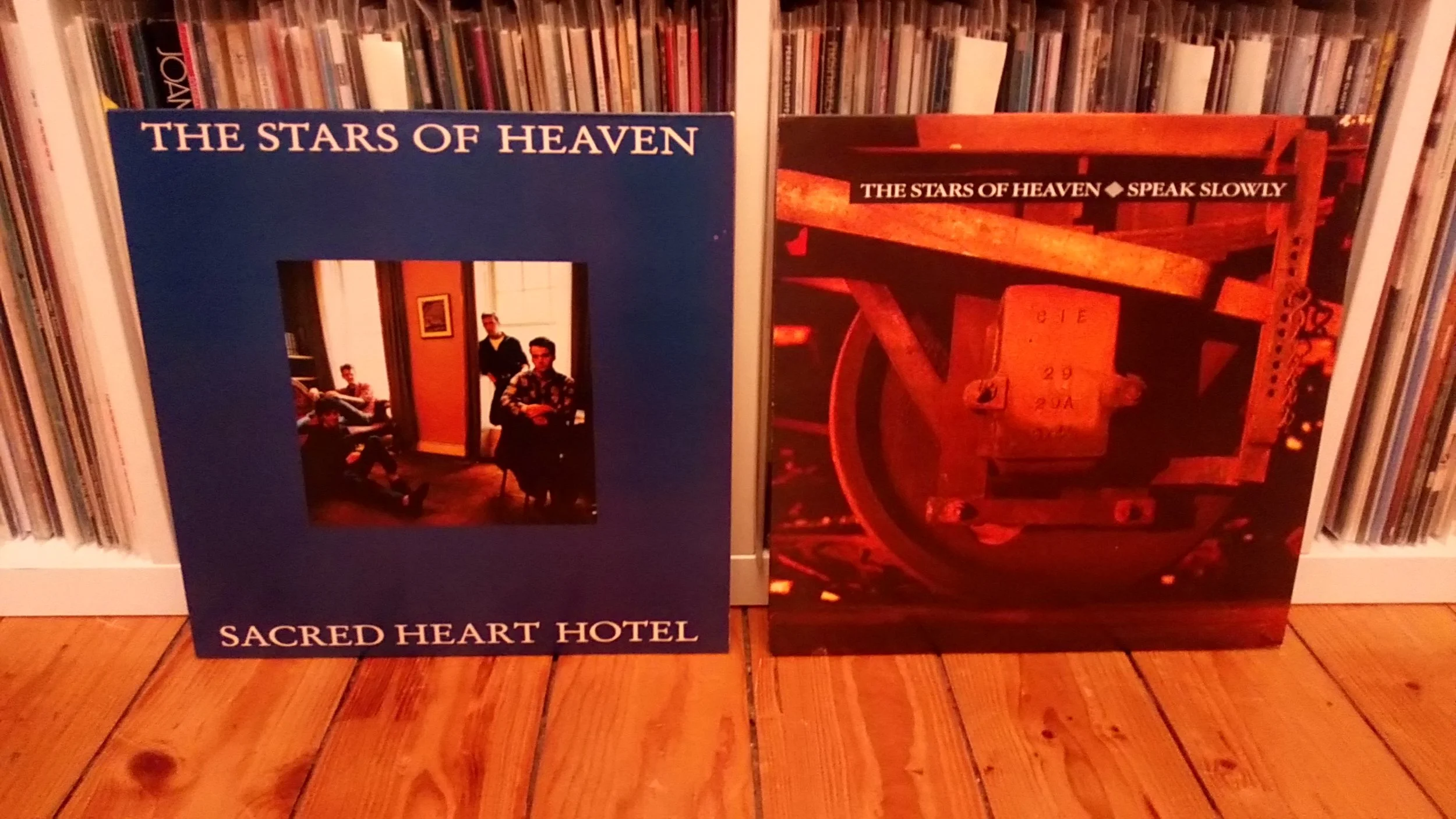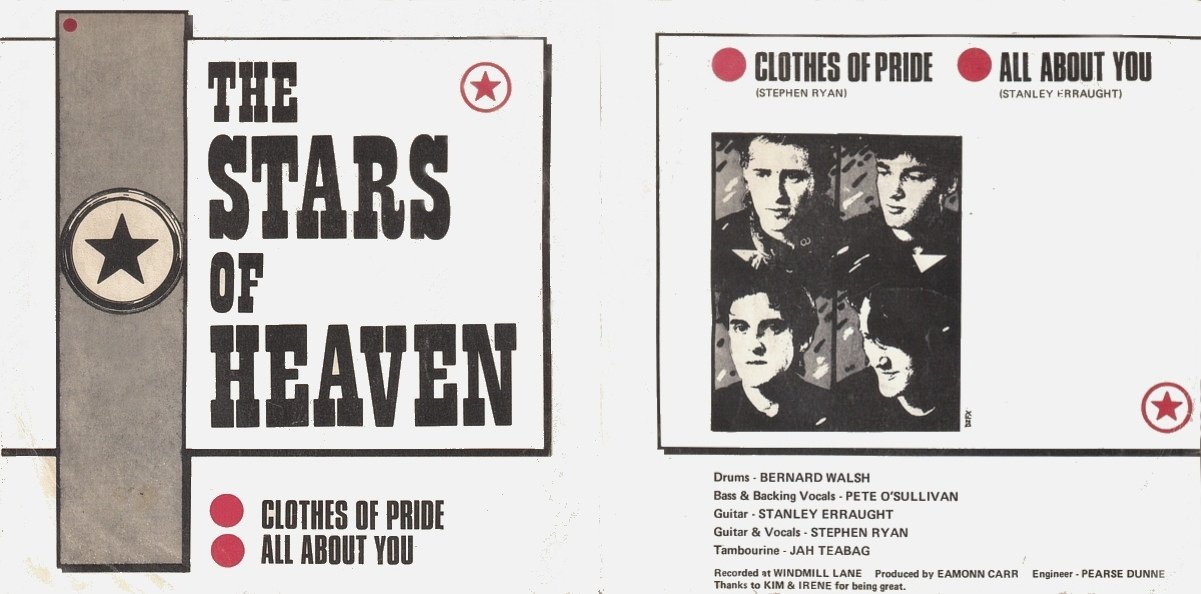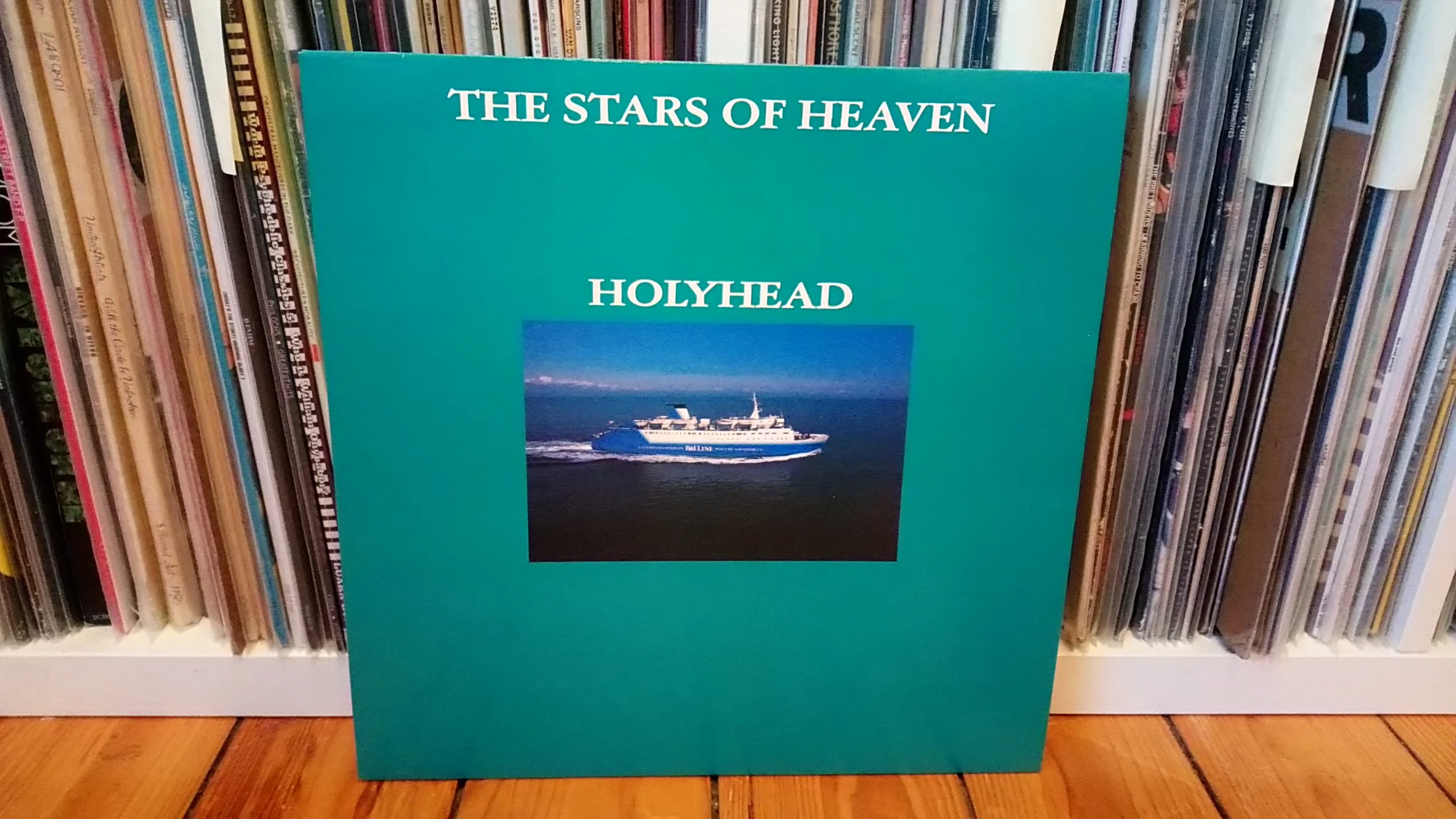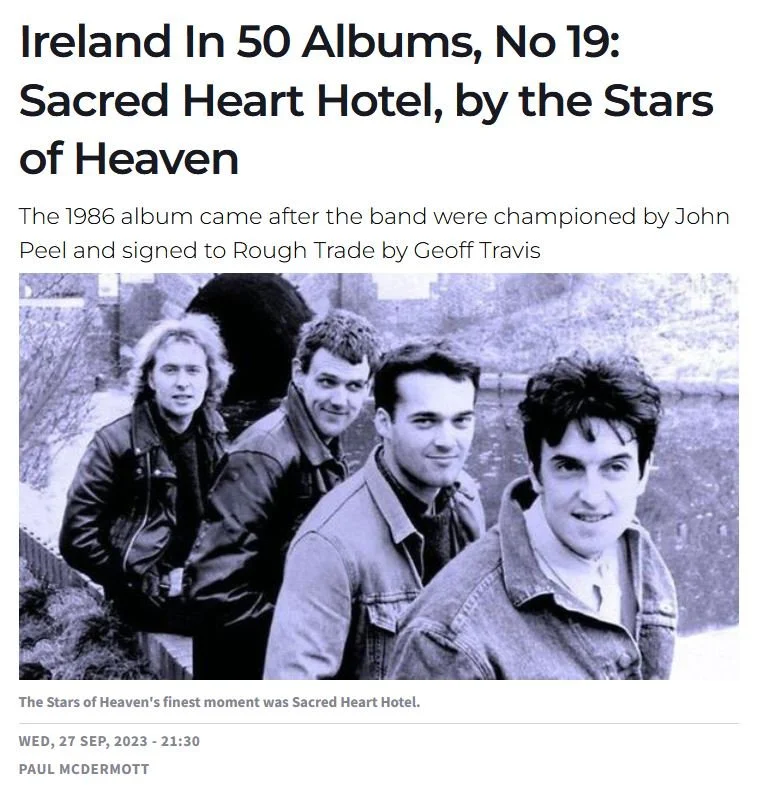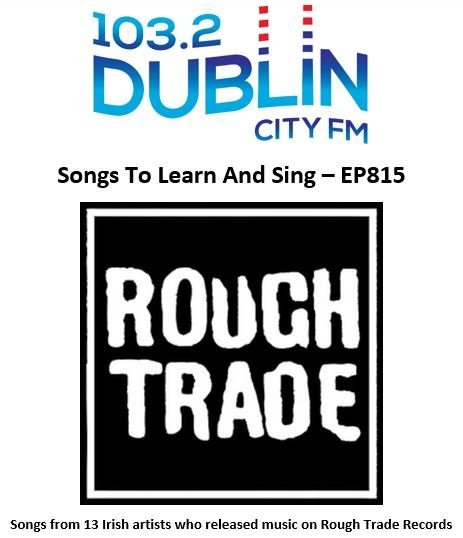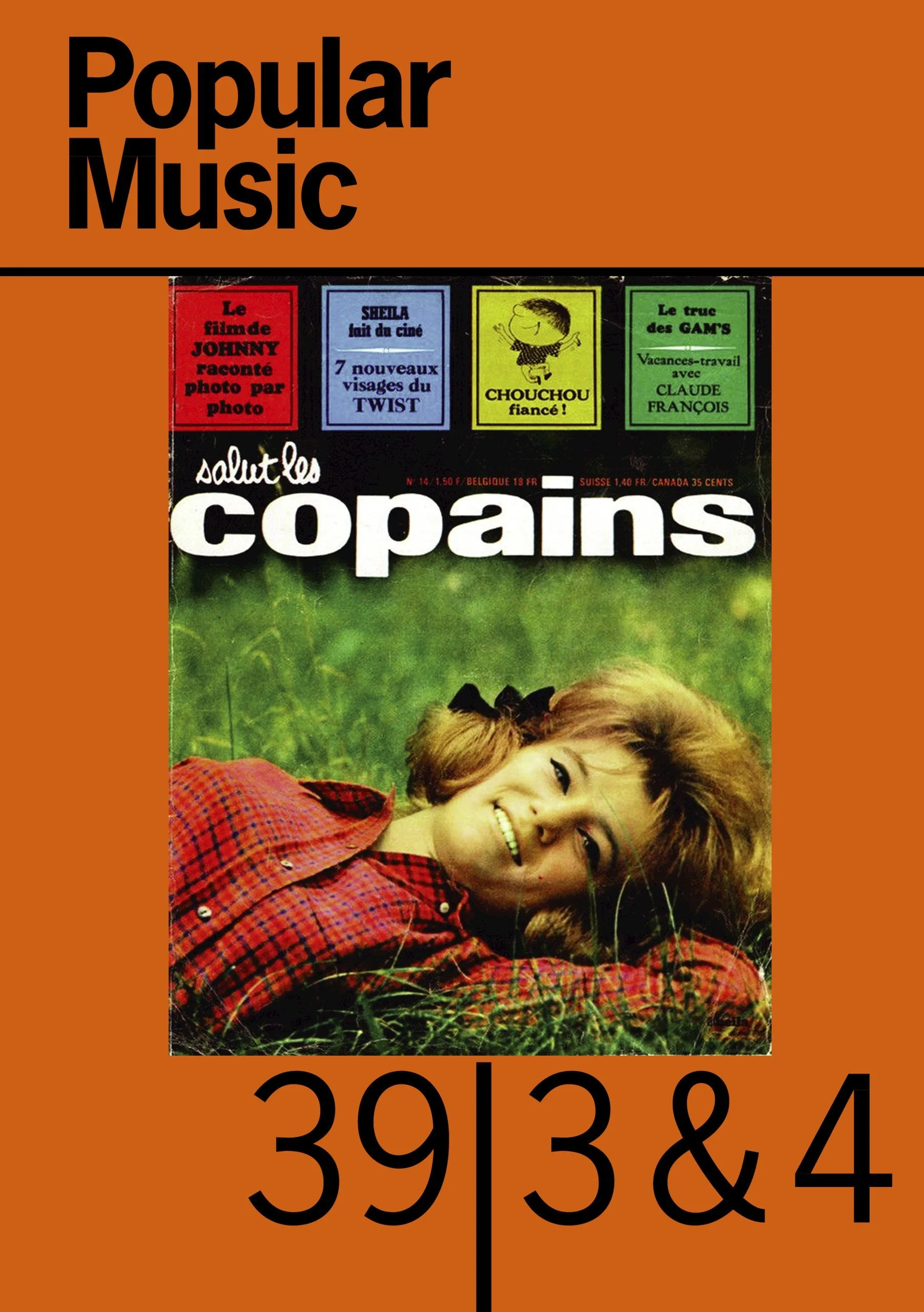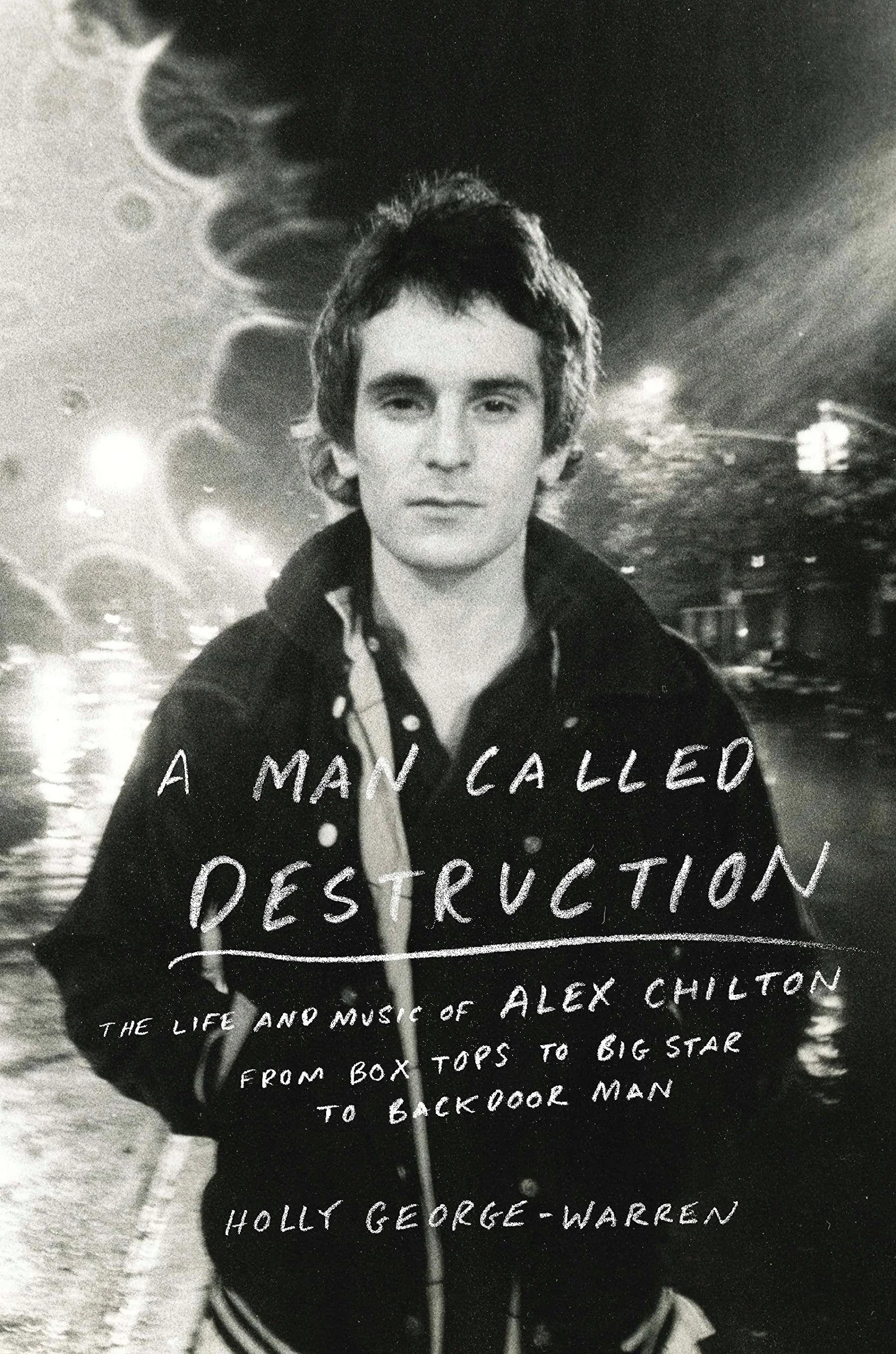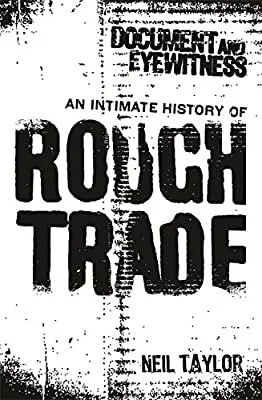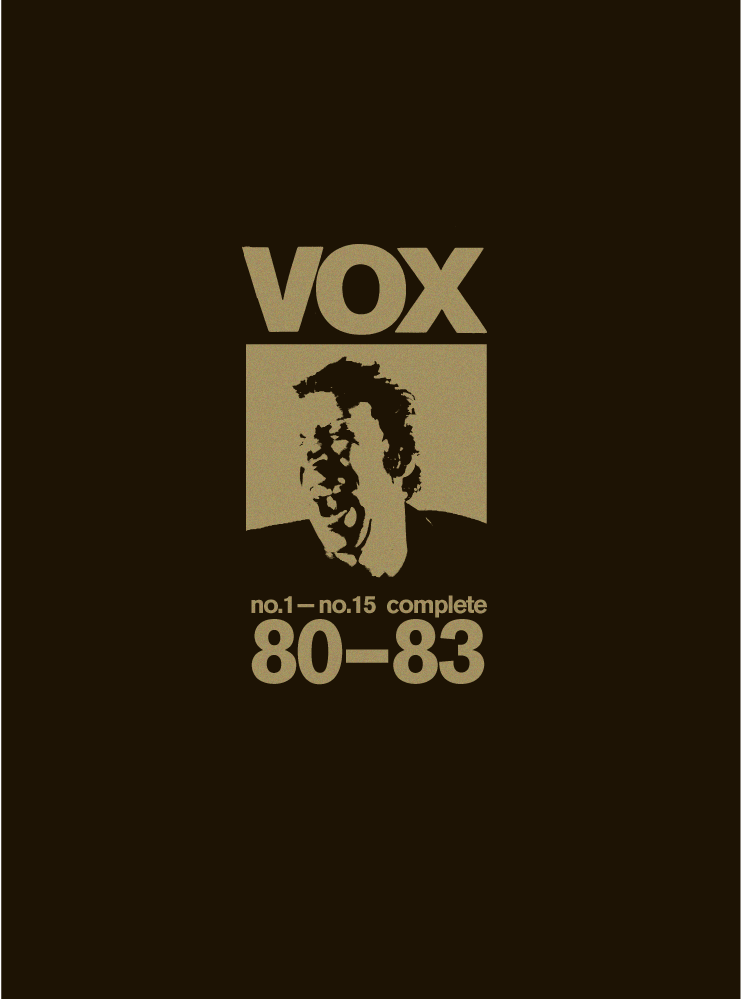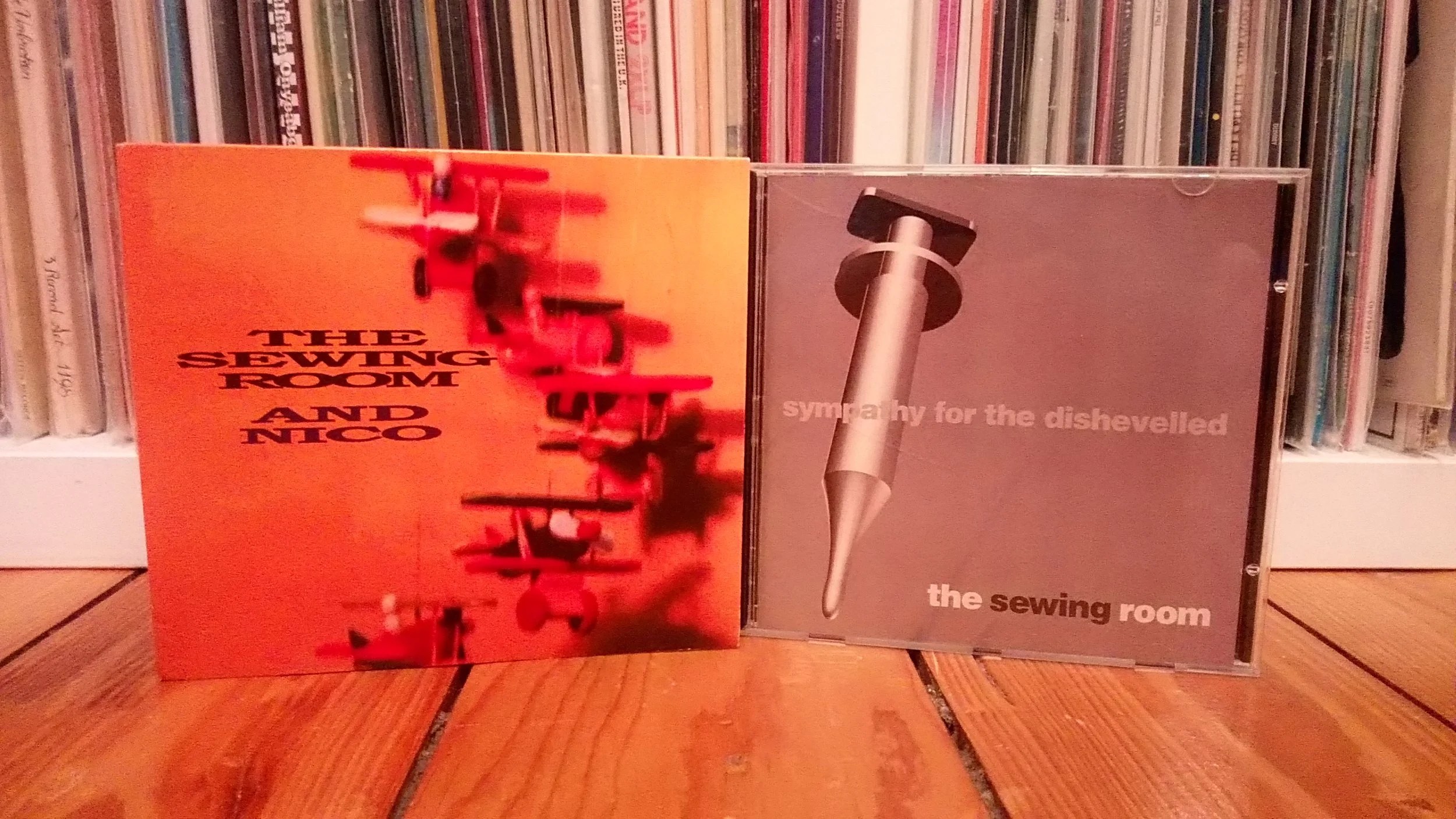Episode 7
Sacred Heart Hotel
& Speak Slowly
by The Stars of Heaven
“Another episode of this fantastic series of podcasts - The Stars of Heaven story brought to life by @O_hOireachtaigh [Stan Erraught}. Well worth a listen.”
Paul Page (Whipping Boy)
Episode 7 - Preview
Sacred Heart Hotel (1986) and Speak Slowly (1988). Photograph by Paul McDermott.
Episode Notes
“If any of The Stars of Heaven are listening I should like to know more about you.”
John Peel (07 October, 1985)
Episode seven of To Here Knows When - Great Irish Albums Revisited focuses on The Stars of Heaven.
The Stars of Heaven were Stephen Ryan on vocals and guitar, Stan Erraught on guitar, Peter O’Sullivan on bass guitar and Bernard Walsh on drums. Stephen and Stan both wrote songs and Stephen sang them. The band were formed in Dublin in 1983 and disbanded in early 1990. They released two albums on Rough Trade Records - Sacred Heart Hotel (1986) and Speak Slowly (1988). The band are described in Barry Lazell’s Indie Hits 1980-1989 as, “Ireland's answer to The Byrds, Gram Parsons and the Velvet Underground all in one package.”
In episodes four and five of this podcast my guests, Blue in Heaven’s Shane O’Neill and Into Paradise’s Dave Long, both talked about attending and playing gigs in the Magnet bar and once more this episode starts with Stan’s recollections of different gigs at the Pearse Street pub. Our conversation also takes in: the late journalist Bill Graham, Stan and Stephen’s shared love of Big Star, Stan’s first bands (Modern Heirs and The Peridots), Vox magazine and Hot Press and how they both covered the scene in the early 80s, rehearsing in Aidan Walsh’s band rooms in Temple Bar, The Stars of Heaven’s second gig in The Ivy Rooms (now Fibber Magees) on a long bill that included My Bloody Valentine, Dublin studios in the early 80s (we talk about the cost of recording in the 80s and power structures within studios), long gone Dublin venues, The Golden Horde, Hotwire Records, the Peel sessions, Rough Trade Records, touring in the UK, working with producers (including Chris O’Brien and Mitch Easter), playing with The Sewing Room in the mid 90s, Stan’s academic career and his current areas of research. It’s a really fascinating hour.
The Stars of Heaven - ‘Clothes of Pride’/‘All About You’ (Hotwire Records, 1985). Images from Discogs.
The Stars (as they became affectionately known) released their debut 7” single ‘Clothes of Pride’/‘All About You’ on Eamon Carr’s Hotwire Records in 1985. John Peel picked up on the single and the band were offered a BBC session. Within days of the session being broadcast in January 1986 Rough Trade’s Geoff Travis had offered to release the recordings. The band added three more songs that were recorded with Chris O’Brien in Dublin and the resulting mini-album Sacred Heart Hotel was released by Rough Trade Records in September 1986, reaching No. 11 in the UK Indie Chart.* Announcing the debut mini-album trade magazine The Catalogue (the Rough Trade publication promoting releases by distribution network The Cartel) wrote that the band:
“[h]ave been riding a crest of a wave around Dublin and London, infecting audiences with their highly charged blend of pop and country crackers. Proud of their influences they readily admit to the enviable after effects of listening to George Jones, The Byrds and Alex Chilton, SofH are also confident in their own musical identity.”
The band told The Catalogue that, “We’re trying to make classic guitar music, we place a very big importance on our tunes and we have this game together where we try and come with chords that no-one’s heard before.”
Positive reviews flowed in. In September 1986 Music Week wrote, “the latest in a long line of quality Irish outfits. This time, though, the focal point is country-esque melodies with a bit of punch. Neat vocals and guitar sound make for a strong seven track mini-platter. An excellent follow-up to the group’s ‘Clothes of Pride’ single of last year.” In early September, 1986 Cath Carroll in her NME review of Sacred Heart Hotel wrote that, “the title track is a comparative epic mourning the premature decay of the lads’ boozy peers in a Galway hotel bar. It’s here that the ghost of Tom Verlaine hovers most obviously in the short-wave flickering of the lower strings, soothing a bleak and strained voice.” Later that month in a live NME review Campbell Stevenson wrote that, “The Stars of Heaven are capable of beating The Long Ryders and Green on Red at their own native game because they have a better sense of economy, and in Stephen Ryan, a singer with the perfect melancholic tone for singing about highways and jukeboxes.”
Rock journalism clichés were in abundance too - Music Week wrote the cringey, “for these Stars, only the sky’s the limit” and the NME subs were happy to let “The Stars of Heaven still shine brightly” onto print, and if your toes aren’t curled yet then how about Melody Maker’s, “there are four Stars of Heaven, enough to form at least a very small dipper.”
The Stars of Heaven - ‘Never Saw You’/‘Widow’s Walk’ (Rough Trade Records, 1987). Images from Discogs.
The Holyhead EP came next in March 1987 reaching No. 5 in the UK Indie Chart.* If ever a record sleeve captured the times it is surely the photograph of a B&I ferry on the 12”. Holyhead and Sacred Heart Hotel were then compiled together for Rough Trade’s overseas markets as the expanded album Rain On the Sea.
The band’s second album Speak Slowly was recorded in 1987 but wasn’t released for almost a year. It finally appeared in June 1988 and reached No. 6 in the UK Indie Chart.*
Upon its release Speak Slowly received quite muted reviews in the NME and Melody Maker. Bob Stanley’s NME review ended with, “Speak Slowly is nothing more than a well-played collection of very average songs.” Ouch. There were some positive reviews, Underground magazine described the record as, “an excellent LP, commercial, compelling and suggestive of yet more to come.” Sadly Underground was wrong and there was no more to come.
Holyhead EP (1987). Photograph by Paul McDermott.
Following the record’s release the band parted company with Rough Trade. In 1989 they recorded with REM producer Mitch Easter for a proposed Mother Records album that didn’t materialise. The Stars broke-up in early 1990. Stephen Ryan formed The Revenants and Stan Erraught joined The Sewing Room. The Mitch Easter recordings along with session tracks, demos and other rarities were released on the Independent Records compilation Unfinished Dreaming in 1999.
In recent years Speak Slowly has gone through a critical revaluation. In a 2015 Irish Times Sunken Treasure column Donal Dineen wrote of the record that, “time has shown it to be a delicately crafted classic. Perhaps the fact that it was out of time worked against the band. It still sounds timeless, a measure of its originality.” It’s a sentiment I would wholeheartedly agree with. The Stars of Heaven were out of time - at the time - and I think that’s why they still sound completely timeless. they were a great band.
* UK Indie Chart positions are taken from Barry Lazell’s Indie Hits: 1980-1989 - the Complete UK Independent Charts (Singles & Albums) published by Cherry Red Books in 1997
For Further Reading/Listening/Viewing:
For the Irish Examiner’s Ireland in 50 Albums series I’ve written about Sacred Heart Hotel…
by Paul McDermott
Irish Examiner - 28 September 2023
The Stars of Heaven are one of thirteen Irish artists who have had their music released by Rough Trade Records (not counting the sub-label River Lea). In 2021 I broadcast an episode of my radio show Songs To Learn And Sing which focused on all thirteen artists, you can listen back to it below.
Rough Trade Ireland
Girl Band – Pears for Lunch (2015)
Virgin Prunes – Baby Turns Blue (1982)
David Kitt – Sleep Comes Tomorrow (2000)
SOAK – B a Nobody (2014)
Princess Tinymeat – Angels in Pain (1986)
Puppy Love Bomb – I’m Not Listening (1994)
Hal – Play the Hits (2004)
Microdisney – Dolly (1984)
The Stars of Heaven – Never Saw You (1987)
Daniel Figgis – Alison Creaking (1995)
Cara Dillon – Black is the Colour (2001)
Lankum – The Dark Eyed Gypsy (2019)
Stiff Little Fingers – Rough Trade (1979)
While talking about the cover of the Holyhead EP with Stan, I mentioned the Green Sleeves exhibition that was curated by Niall McCormack and Dr Ciarán Swan at the National Print Museum in 2017. The exhibition detailed seven decades of LP covers in Ireland and examines:
“[t]he Irish-printed album cover. Included album covers were all designed or printed in Ireland. The work was completed for Irish groups, who worked at home or abroad, as well as albums from abroad referencing Ireland or Irishness. The collection dates from the late 1950s to the present day, and covers a wide range of musical and non-musical genres.”
In an episode of my radio show Songs To Learn And Sing below I chat to Niall and Ciarán about the exhibition, printing in Dublin, the evolution in design of record sleeves, the showbands, country & Irish, Irish punk, and contemporary design.
The exhibition is available to view online here.
Shimmy Marcus’s 2000 documentary Aidan Walsh - Master of the Universe is mentioned in the episode. The Stars of Heaven rehearsed in band rooms that Aidan ran in Temple Bar in the mid-80s. “Chapter 8 - Gonna Live Forever” of the film tells the story of the band rehearsal rooms that Aidan ran with Paddy Dunning. The documentary includes footage of the first line-up of My Bloody Valentine rehearsing - in the episode Stan also recalls seeing this original MBV line-up play live. The Irish Times described the film as, “an immensely entertaining and surprisingly touching filmed portrait of a unique and colourful character.” The film was available on Vimeo for a period but unfortunately seems to have been removed. It’s well worth tracking down.
“Irish country music, in all its forms, colonised a space between the centre and periphery through the rich network of communication and cultural transmission between rural Ireland and Irish emigrant communities in British cities and was, in its way, a lot more quietly cosmopolitan in its reach than Irish rock music before the late 1970s, anxiously courting the attention of a largely oblivious British market.”
Stan Erraught - ‘The country and Irish problem.”
In the episode Stan and I discuss his article ‘The country and Irish problem’ published in Volume 39 of the journal Popular Music. It’s available online from the Cambridge University Press here.
‘The country and Irish problem’
by Stan Erraught
Popular Music, 39(3-4), 568-584 (2020)
The Alec Chilton biography that Stan mentions in the episode is A Man Called Destruction by Holly George-Warren. Of the book, NPR wrote: “It’s hard not to compare A Man Called Destruction to Big Star: Nothing Can Hurt Me, the 2012 documentary that covers so much of the same ground. But where the film rightly splits its focus between Chilton and his co-leader Chris Bell, the book dwells on the man who has most captured the hearts and minds of generations of fans and fellow musicians… [t]he poignantly plainspoken story of Chilton’s troubles pulls back the blanket of superlatives he’s been smothered with for decades, instead delivering a sober portrait of a life that was anything but. George-Warren doesn’t mistake the myth for the territory, and A Man Called Destruction succeeds because of it.”
A Man Called Destruction: The Life and Music of Alex Chilton, from Box Tops to Big Star to Backdoor Man
by Holly George-Warren
(Viking Press, 2014).
“The story of what happened is simple and sadly not as interesting as people think it is. We’d been together with Rough Trade for a long time, very tight. The band had had no manager so the two principal members of the group were dealing with the label and, like any relationship when you are very close and you are spending a lot of time together, things got blown out of proportion from both sides.”
Johnny Marr (in Document and Eyewitness)
In the episode Stan also chats about observing the inner workings of Rough Trade, the financial pressure the label was under and draws comparisons to Virgin Records in the early 70s. For anyone interested in delving deeper into the story of Rough Trade I recommend Neil Taylor’s Document and Eyewitness, his account of 25 years of the label. It’s an oral history telling the famed label’s story from 1976 up to its collapse, the collapse of the distribution arm in the early 90s and the eventual re-emerging of the label in the early 00s. It’s a fascinating story told by all of the main principals.
Document and Eyewitness: An intimate History of Rough Trade by Neil Taylor
(Orion, 2010)
“Founded by Dave Clifford in 1980, Vox was a seminal early-eighties Dublin magazine featuring avant-garde art, post-punk music and youth subcultures.
Over its fifteen issues Vox featured a diverse array of music, ranging from Throbbing Gristle to Christy Moore.”
Hi-Tone Books
In 2018 Hi Tone Books published a beautiful compendium of all 15 issues. In Stan’s introduction to this compendium he expands on some of the ideas we talk about in the episode: the cost of records in the early 80s, the power of studio engineers, the cost of recording, venues in Dublin and beyond and more. The compendium sold out its print run but some photographs are available on Hi-Tone’s website here.
Vox 80-83
by Dave Clifford and individual contributors
(Hi-Tone Books, 2018)
The Sewing Room: And Nico (Dead Elvis Records, 1995) and Sympathy For the Dishevelled (Dead Elvis Records, 1997).
Photograph by Paul McDermott
Stan produced Hey Paulette’s second single ‘I Really Do Love Penelope’ (Micky Rourke’s Fridge, 1990). Hey Paulette’s Colm Fitzpatrick and Eamonn Davis along with Dez Foley went on to form The Sewing Room in the 90s and Stan joined on guitar. The band put out two great albums on the Dead Elvis label - And Nico (1995) and Sympathy For The Dishevelled (1997). They are two of my favourite albums of the 90s and are well worth tracking down. And Nico can be listened to below.
